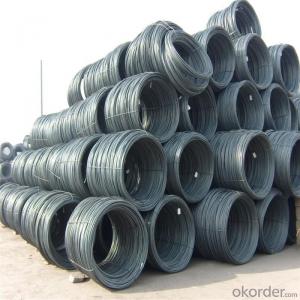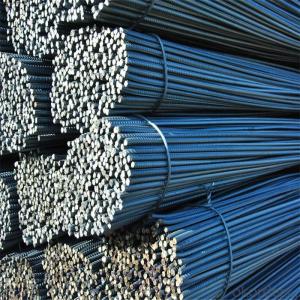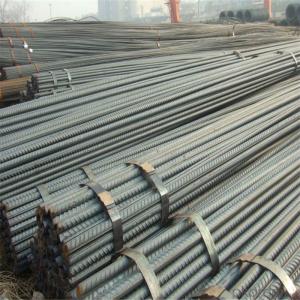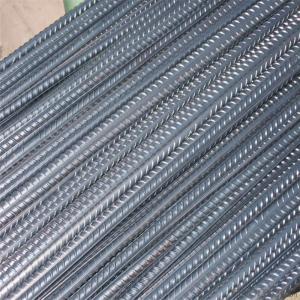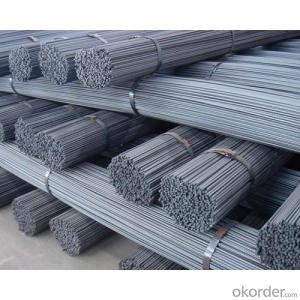Reinforcing Twisted Steel Bars
- Loading Port:
- Tianjin
- Payment Terms:
- TT OR LC
- Min Order Qty:
- 140 m.t.
- Supply Capability:
- 500000 m.t./month
OKorder Service Pledge
OKorder Financial Service
You Might Also Like
Item specifice
Reinforcing Twisted Steel Bars
Description of Reinforcing Twisted Steel Bars
1, Diameter: 5.5mm-10mm Reinforcing Twisted Steel Bars
10m- 40mm Reinforcing Twisted Steel Bars
2, Length: 6m, 9m, 12m or customized
3, Standard: GB, ASTM, AISI, SAE, DIN, JIS, EN
OEM technology - send detailed technical parameters for accurate quotation.
2, Produce Process: smelt iron - EAF smelt billet - ESR smelt billet -
hot rolled or forged to get the steel round bar and plate
3, Heat Treatment: annealing, normalizing, tempering, quenching
4, Surface Treatment: Black
5, Quality Assurance: We accept third party inspection for all orders.
You can ask testing organizations such as SGS, BV, etc. to test our products before shipping.
Chemical Composition of Reinforcing Twisted Steel Bars
Grade | Technical data of the original chemical composition(%) | |||||
Reinforcing steel bar HRB335 | C | Mn | Si | S | P | B |
≤0.25 | ≤1.60 | ≤0.80 | ≤0.045 | ≤0.045 | >0.0008 | |
Physics Capability | ||||||
Yield Strength(N/cm2) | Tensile Strength(N/cm2) | Elongation(%) | ||||
≥ 335 | ≥490 | ≥16 | ||||
Reinforcing steel bar HRB400 | C | Mn | Si | S | P | B |
≤0.25 | ≤0.16 | ≤0.80 | ≤0.045 | ≤0.045 | 0.04-0.12 | |
Physics Capability | ||||||
Yield Strength(N/cm2) | Tensile Strength(N/cm2) | Elongation(%) | ||||
≥ 400 | ≥ 570 | ≥ 14 | ||||
Products Show of Reinforcing Twisted Steel Bars
Company Information
CNBM International Corporation is the most important trading platform of CNBM group.
Whith its advantages, CNBM International are mainly concentrate on Cement, Glass, Iron and Steel, Ceramics industries and devotes herself for supplying high qulity series of refractories as well as technical consultancies and logistics solutions.


F A Q
1, Your advantages?
professional products inquiry, products knowledge train (for agents), smooth goods delivery, excellent customer solution proposale
2, Test & Certificate?
SGS test is available, customer inspection before shipping is welcome, third party inspection is no problem
3, Factory or Trading Company?
CNBM is a trading company but we have so many protocol factories and CNBM works as a trading department of these factories. Also CNBM is the holding company of many factories.
4, Payment Terms?
30% TT as deposit and 70% before delivery.
Irrevocable L/C at sight.
5, Trading Terms?
EXW, FOB, CIF, FFR, CNF
6, After-sale Service?
CNBM provides the services and support you need for every step of our cooperation. We're the business partner you can trust.
For any problem, please kindly contact us at any your convenient time.
We'll reply you in our first priority within 24 hours.
- Q:What are the safety considerations when handling special steel products?
- When handling special steel products, some important safety considerations include wearing appropriate personal protective equipment (PPE) such as gloves, safety glasses, and steel-toe boots to protect against cuts, burns, and impact injuries. It is also crucial to ensure proper lifting techniques are employed to prevent strains or back injuries. Additionally, storing the steel products in a secure and organized manner can help prevent accidents and injuries. Regular inspections of the equipment and tools used for handling the steel products should be carried out to identify any potential hazards or defects. Lastly, proper training and awareness of the specific safety protocols and procedures related to handling special steel products are essential to minimize risks and maintain a safe working environment.
- Q:What are the requirements for special steel used in corrosive environments?
- The requirements for special steel used in corrosive environments include high resistance to corrosion, especially against specific corrosive agents such as acids, alkalis, or saline solutions. The steel should possess a strong passive film formation ability, preventing further corrosion. It should also have good mechanical properties, including high strength and toughness, to withstand the harsh conditions. Additionally, the steel must possess good welding and fabrication characteristics, as well as be cost-effective and readily available.
- Q:How is high-strength stainless steel used in the production of structural components?
- High-strength stainless steel is commonly used in the production of structural components due to its exceptional durability, corrosion resistance, and ability to withstand high stress and heavy loads. It is often employed in construction, automotive, aerospace, and marine industries to create beams, columns, frames, and other critical parts that require strength and longevity. Its superior properties enable the creation of lighter, more efficient structures without compromising on safety or structural integrity.
- Q:What are the challenges in heat treating special steel?
- Some of the challenges in heat treating special steel include achieving uniform heating and cooling rates, controlling distortion and warping, managing the formation of unwanted phases or microstructures, maintaining precise temperature control, and ensuring consistent and repeatable results. Additionally, special steels may have specific alloying elements or compositions that require specialized heat treatment processes or equipment, further adding to the complexity and challenges in heat treating these materials.
- Q:How is special steel used in the production of molds and dies?
- Special steel is used in the production of molds and dies due to its exceptional durability, hardness, and resistance to wear and tear. This type of steel can withstand high temperatures and pressures, making it ideal for shaping and forming various materials. By using special steel, molds and dies can be manufactured with precision and reliability, ensuring the production of high-quality and accurate parts.
- Q:How does special steel contribute to the transportation industry?
- Special steel plays a crucial role in the transportation industry by providing strength, durability, and reliability to various components and structures. It is used in the construction of vehicle bodies, engines, chassis, and suspension systems, ensuring safety and longevity. Additionally, special steel's high resistance to corrosion and fatigue helps extend the lifespan of transportation equipment, reducing maintenance costs and enhancing efficiency. Overall, special steel enhances the performance, efficiency, and safety of vehicles, making it an invaluable material in the transportation industry.
- Q:How is special steel heat treated?
- Special steel is heat treated using a combination of heating and cooling processes to improve its strength, hardness, and other desired properties. This typically involves heating the steel to a specific temperature, known as the austenitizing temperature, followed by rapid cooling, known as quenching, to transform the steel's microstructure. This is then followed by tempering, where the steel is reheated to a lower temperature to relieve internal stresses and further enhance its mechanical properties. The specific heat treatment process and parameters vary depending on the type of special steel and the desired final properties.
- Q:How is special steel used in the production of automotive springs?
- Special steel is used in the production of automotive springs due to its unique properties that make it ideal for this application. Automotive springs, such as suspension springs and valve springs, need to be able to withstand heavy loads, repetitive stress, and high temperatures. Special steel, also known as alloy steel, is specifically designed to have enhanced mechanical properties compared to regular steel. It is typically made by adding additional alloying elements such as chromium, nickel, or molybdenum to improve its strength, hardness, and resistance to wear and fatigue. In the production of automotive springs, special steel is used to create springs that can handle the demanding conditions of the vehicle's suspension system. These springs must be able to absorb and distribute the weight of the vehicle, while also providing a smooth and comfortable ride. The high strength of special steel allows automotive springs to withstand heavy loads without deforming or breaking. This is crucial to ensure the stability and safety of the vehicle, especially during rough road conditions or when carrying heavy loads. Moreover, special steel's resistance to fatigue is essential in the production of automotive springs. These springs undergo millions of cycles of compression and expansion during the vehicle's lifetime. The fatigue resistance of special steel ensures that the springs can maintain their performance and reliability over an extended period. Additionally, special steel's resistance to wear and corrosion is beneficial in automotive applications. Springs are exposed to various environmental elements, such as moisture, dirt, and chemicals, which can lead to corrosion and degradation. Special steel's corrosion resistance helps to prolong the lifespan of automotive springs and maintain their functionality. In summary, the use of special steel in the production of automotive springs ensures that these critical components can withstand heavy loads, repetitive stress, and high temperatures. Its enhanced mechanical properties, including strength, fatigue resistance, and corrosion resistance, make it an ideal material choice for automotive springs, contributing to the overall performance and durability of vehicles.
- Q:How does special steel perform in electrical applications?
- Special steel is typically used in electrical applications due to its excellent conductivity and high resistance to corrosion. It provides efficient electrical conductivity, ensuring minimal power loss and heat generation. Additionally, special steel exhibits good magnetic properties, making it suitable for applications that require magnetic fields, such as transformers and motors. Overall, special steel performs exceptionally well in electrical applications, meeting the demanding requirements of the industry.
- Q:What are the main advantages of using special steel in the aerospace industry?
- The main advantages of using special steel in the aerospace industry include its high strength-to-weight ratio, excellent fatigue resistance, and good corrosion resistance. Special steel can withstand extreme temperatures and pressures, making it ideal for critical components like aircraft engines and landing gear. Additionally, its superior mechanical properties and reliability contribute to improved safety and performance in aerospace applications.
1. Manufacturer Overview |
|
|---|---|
| Location | |
| Year Established | |
| Annual Output Value | |
| Main Markets | |
| Company Certifications | |
2. Manufacturer Certificates |
|
|---|---|
| a) Certification Name | |
| Range | |
| Reference | |
| Validity Period | |
3. Manufacturer Capability |
|
|---|---|
| a)Trade Capacity | |
| Nearest Port | |
| Export Percentage | |
| No.of Employees in Trade Department | |
| Language Spoken: | |
| b)Factory Information | |
| Factory Size: | |
| No. of Production Lines | |
| Contract Manufacturing | |
| Product Price Range | |
Send your message to us
Reinforcing Twisted Steel Bars
- Loading Port:
- Tianjin
- Payment Terms:
- TT OR LC
- Min Order Qty:
- 140 m.t.
- Supply Capability:
- 500000 m.t./month
OKorder Service Pledge
OKorder Financial Service
Similar products
New products
Hot products
Related keywords
